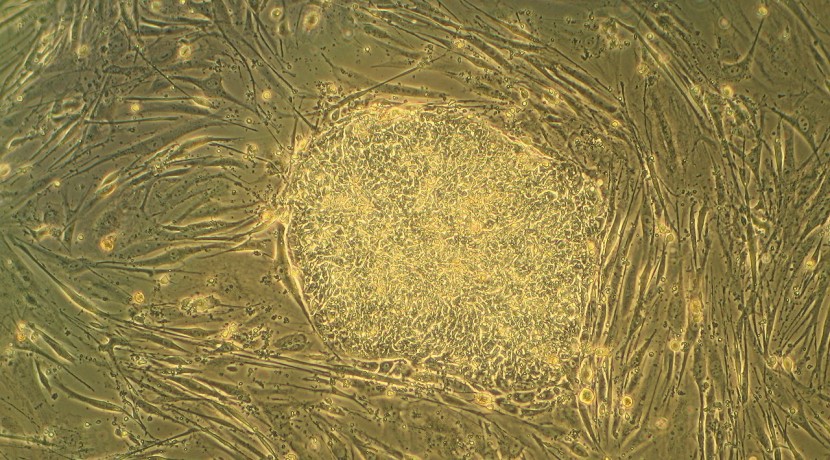What’s the Cure for Blindness Based on Ignorance? Stem Cell Research and the Religious Right
Scientists have long suspected that research using embryonic stem cells could lead to new, more effective treatments and cures for a myriad of diseases, from deafness to paralysis, and studies using stem cells in rodents have had promising results. Now, doctors in the United Kingdom are taking steps to determine if stem cells could be used to treat a certain type of blindness in humans.

A colony of embryonic stem cells (center) from the H9 cell line.
Over the next year, ten patients suffering from neovascular macular degeneration will undergo an operation to transplant eye cells, derived from stem cells, behind their retinas. Neovascular macular degeneration, also called “wet” macular degeneration, takes place when blood vessels begin growing and leaking blood and fluid, thereby damaging the retina and inducing central vision loss. Individuals with macular degeneration can only see with their peripheral vision, and the disease makes everyday activities such as driving or reading impossible.
Researchers are optimistic that the procedure will reverse the patients’ vision loss. If even some of their sight is restored, the stem cell treatment could go a long way to improving patients’ independence, sense of empowerment, and overall quality of life. Doctors are also hopeful that if the trial is successful, it could be used to treat other forms of blindness, such as non-neovascular macular degeneration, or “dry” macular degeneration, which causes a more gradual loss of sight.
The possibilities that this study opens for understanding and treating a whole host of diseases related to blindness should be exciting to many people. Unfortunately, in the United States conservatives on the religious right have long opposed embryonic stem cell research for many of the same reasons that they oppose abortion. In their quest to obtain personhood status for embryos and convince the public that a cluster of cells is morally equivalent to a living human being, the religious right has slowed the progress of medical advancements that could ease suffering and extend human life and health. Under George W. Bush’s administration, the government severely limited how researchers could use federal funds to study embryonic stem cell. Barack Obama’s administration reversed those limitations, but with so many of the 2016 presidential candidates eager to pander to conservatives, humanists may wonder what restrictions to scientific and medical progress the next crop of GOP politicians would put in place.
The political and legal discussions surrounding embryonic stem cell research often refer to ethics and human worth. According to the United States Conference of Catholic Bishops, a group that opposes both stem cell research and abortion, “The dignity of a person must be recognized in every human being from conception to natural death.” This seemingly innocuous statement actually has implications that would leave many humanists shaking their heads in dismay. By declaring that the moment of conception is when one has the full dignity of personhood, presumably because this moment is when one has a supernatural soul or spirit, the statement declares that using three- to five-day-old embryonic stem cells for medical research is tantamount to murder. The pain, suffering, and even death of human beings who could benefit from treatments derived from stem cell research are completely disregarded. The Catholic Church, like many religious traditions, often views suffering as noble and encourages adults, tainted with sin, to accept their misery without attempting to mitigate it. Mother Teresa, known for her compassion, adopted this perspective so completely that she subjected diseased individuals in her care to poor hygienic conditions and denied them medicine.
The humanist perspective on suffering is completely different. According to the American Humanist Association’s recently adopted Resolution Affirming Human Rights for All, “The American Humanist Association affirms the worth and dignity of all persons. This worth arises from the self-awareness, the capacity to love and suffer, and the great longing we all have to flourish.” This resolution also specifies that “humans in very early stages of development have not developed personalities, capacities to love, nor aspirations for personal fulfillment” and therefore cannot have the status of personhood. This perspective, which recognizes humans as biological and material, without souls or spirits, places its ethical focus soundly on the well-being and dignity of human beings, not stem cells. Under this view, women are deserving of respect and dignity and have the right to terminate a pregnancy if they so choose and scientists can and should investigate embryonic stem cell therapies that can lead to treatments and even cures for such debilitating diseases as Alzheimer’s and Parkinson’s.
Through studying stem cells, scientists may someday be able to cure a whole host of maladies that today cause people both physical and emotional pain and suffering. But in order to encourage government funding for this research, humanists must first attempt to cure the ignorance surrounding stem cell research and inform the public that it is not equivalent to “killing a baby” as the religious right typically cries, but instead is creating new treatments to sustain and extend human life.Tags: Stem Cells
